多くの成功したサイトオーナーは、最初のWordPressサイトを見て、本当にコンテンツが読まれているのだろうかと疑問に思ったことを覚えていることだろう。
最初のうちは、訪問者をトラッキングしたり、訪問者の行動を理解したりする方法がわからないのが普通です。Google アナリティクスのようなツールの出番です。
人々があなたのコンテンツにどのように接するかを知ることは、あなたのサイトを成長させる鍵です。忠実な読者を作りたいかもしれません。あるいは、売上を伸ばしたり、ニッチな分野で投稿者を増やそうとしているかもしれません。
どのような目標であれ、サイトトラフィックデータはその達成に役立ちます。何がうまくいっているのか、何がうまくいっていないのか、どこを改善すればいいのかがわかります。
長年にわたり、私たちは数え切れないほどのサイトオーナー様のWordPressサイトへのGoogleアナリティクスインストールをお手伝いしてきました。現在でも、オーディエンスを理解し、より賢明な意思決定を行うための最良の方法です。
このガイドでは、WordPressにGoogleアナリティクスをインストールするための正確な手順を説明します。すでに大変な作業は完了していますので、手間をかけずに設定することができます。🚀

まず、なぜGoogleアナリティクスが重要なのか、そしてどのようにサイトを成長させることができるのかを説明します。
その後、Googleアナリティクスのアカウント登録方法と、WordPressサイトへのインストール方法をご紹介します。
最後に、Google アナリティクスでトラフィックレポートを表示する方法を説明します。
この投稿で学ぶことの概要を簡単に説明しよう:
- Why Is Google Analytics Important for Bloggers?
- How to Sign Up With Google Analytics
- How to Install Google Analytics in WordPress
- Method 1: Google Analytics for WordPress by MonsterInsights
- Method 2: Install Google Analytics in WordPress With WPCode
- Method 3: Install Google Analytics in WordPress Theme
- Viewing Reports in Google Analytics
- Making the Most Out Of Google Analytics
- Video Tutorial
準備はいいかい?始めよう
なぜGoogleアナリティクスはブロガーにとって重要なのか?
ブログを始めたら、一番の目標はトラフィックと購読者を増やすことです。Google アナリティクスは、重要な統計情報を表示することで、データに基づいた意思決定を支援します。見ることができます:
誰があなたのサイトを訪問しますか?
アナリティクスのこの部分には、ユーザーの地理的な位置、ユーザーがサイトを訪問する際に使用したブラウザー、画面の解像度、JavaScriptのサポート、Flashのサポート、言語などのその他の重要な情報が表示されます。
このデータは非常に便利で、さまざまな面で役立ちます。カスタムサイトのデザインを作成する際、ユーザーデータを使用して、サイトがオーディエンスに適合していることを確認することができます。
ほとんどのユーザーがFlashをサポートしていないのであれば、サイトにFlash要素を追加するのは避けるべきです。ユーザーのほとんどが1280の画面解像度を使用している場合は、その解像度以下に対応したデザインにしてください。
あなたのサイトを訪れた人は何をするのか?
ユーザーがサイトのどこに移動しているのか、どれくらいの時間滞在しているのか、直帰率(初回訪問時にサイトを離脱したユーザーの割合)などをトラッキングすることができます。
この情報を使うことで、直帰率を減らし、ページビューを増やすことができる。
また、最も人気のある投稿、あまりうまくいっていない投稿、ユーザーが求めているコンテンツも見つけることができます。
人々はいつサイトを訪れるのか?
あなたのサイトで1日のうち最もホットな時間帯を調べることで、投稿を公開するのに最適な時間を選ぶことができます。その時間帯があなたの時間帯と合わない場合は、その時間帯に投稿をスケジュールすることができる。
人々はどのようにしてあなたのサイトを見つけるのでしょうか?
アナリティクスのこのセクションは、ユーザーがどこから来たかを示します。例えば、検索エンジンを利用したのか、直接リンクを入力したのか、他のサイトからのリファラーリンクをクリックしたのか。
また、それぞれのソースからの訪問者の割合も表示されます。Google アナリティクスでは、これらのカテゴリーごとの内訳を見ることができます。検索エンジンのカテゴリーであれば、Google、Yahoo、Bingなど、どの検索エンジンからのトラフィックが最も多いかがわかります。
参照元の内訳を見れば、どのサイトと最も連携する必要があるかがわかる。リファラーの参照元がFacebookであれば、Facebook限定のコンテンツが必要です。
リファラーの参照元が外部のサイトである場合、そのサイトとの提携(ゲスト投稿の交換など)を検討するとよいだろう。
人々はあなたのコンテンツにどのように接しているのか?
Google アナリティクスは、ユーザーがサイトのコンテンツにどのようにアクセスしているかを表示します。ユーザーの何パーセントがあなたのサイトのどのリンクをクリックしたかなどがわかります。
Google アナリティクスでコンテンツ実験を行うことで、A/Bスプリットテストを実施し、目標を達成するために何が最も効果的かを理解することができます。
ユーザーのインタラクティブ性を見ることで、ユーザーに合わせてコンテンツを作成することができます。上記の質問に対する答えを見ることで、サイトに効果的な戦略に集中し、効果的でない方法を避けることができます。
簡単に言えば、推測を排除し、重要な統計に集中することで、データに基づいた意思決定ができるようになる。
Google アナリティクスへの登録方法
Googleアナリティクスは無料で利用でき、登録に必要なのはGoogleまたはGmailのアカウントだけだ。登録方法はとても簡単です。以下のステップバイステップの手順に従って、Googleアナリティクスアカウントを作成するだけです。
ステップ1:まず、Googleアナリティクスのサイトにアクセスして登録します。サイトにアクセスしたら、「今すぐ始める」ボタンをクリックします。
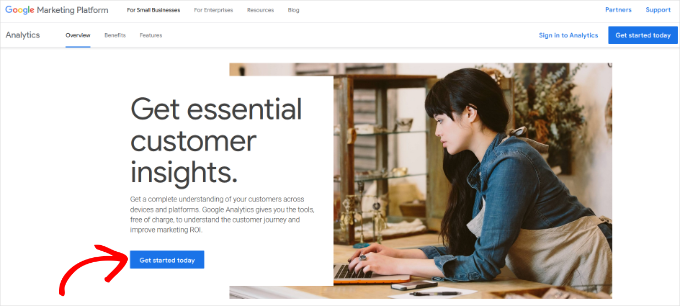
次に、Googleアカウントでログインするよう求められます。
すでにGoogleやGmailのアカウントを持っている場合は、それを使ってログインできます。そうでない場合は、Googleアカウントを作成してください。
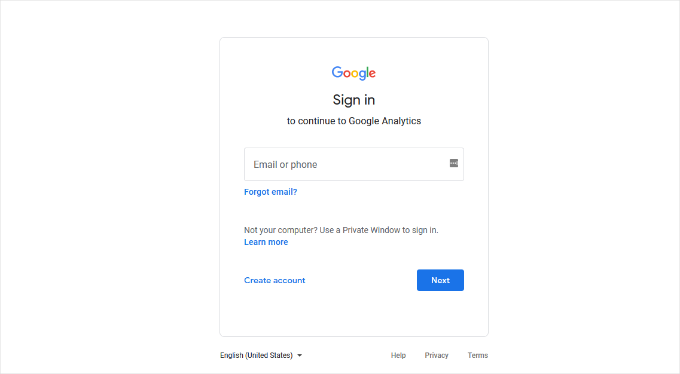
ステップ2:Gmailアカウントでサインインすると、以下のようなウェルカム画面が表示されます。
ここでGmailアカウントを使ってGoogleアナリティクスに登録します。測定開始」ボタンをクリックしてください。
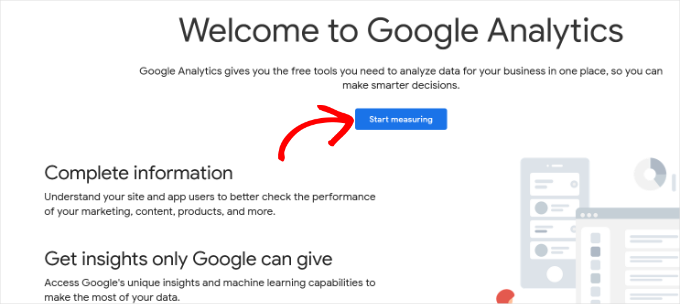
その後、アカウント名の入力を求められます。
この名前は社内で使用されるため、ビジネスネームのように何でも使用できます。
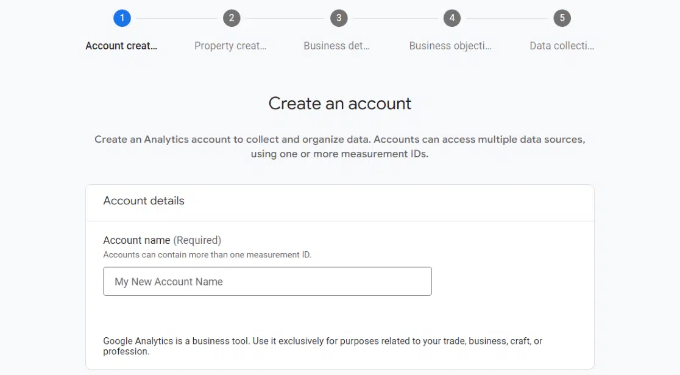
Google アナリティクスでは、複数のアカウントのデータ共有設定も表示されます。
これらの設定により、Googleアナリティクスデータの共有をコントロールすることができます。初期設定のまま次のステップに進んでください。

ステップ3:次の画面では、Googleアナリティクスのプロパティを作成する必要があります。
Googleは、Googleアナリティクス4またはGA4と呼ばれるアナリティクスの新バージョンを導入しました。これは、サイトとモバイルアプリを同じアカウントでトラッキングする最新バージョンです。さらに、新しい機能、測定基準、レポートのインターフェースが追加されました。
プロパティ名を入力し、レポートのタイムゾーンと通貨を選択します。次に「次へ」ボタンをクリックします。
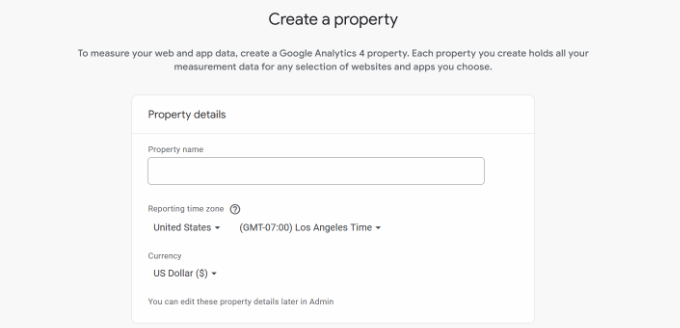
次の画面では、ドロップダウンメニューからあなたのサイトの「カテゴリー」を選択し、所定のオプションから「ビジネスサイズ」を選択する必要があります。
完了したら、「次へ」ボタンをクリックします。
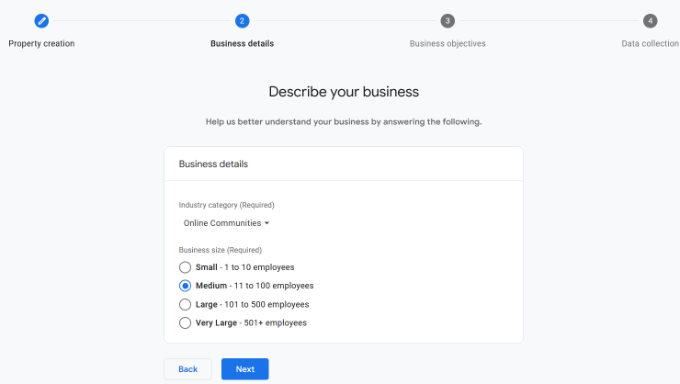
次に、ビジネスの目的を選択し、Google アナリティクスをどのように使用するかを選択する必要があります。これにより、あなたのビジネスにパーソナライズされたレポートを得ることができます。
例えば、リードの生成、オンライン販売の促進、ブランド認知度の向上、ユーザー行動の調査などのオプションがある。
複数のオプションを設定することも、ニーズに合わせて指定されたオプションのすべてを選択することもできます。ベースラインレポートを取得する」オプションを選択すると、Google アナリティクスレポートがすべてアカウントに反映されます。
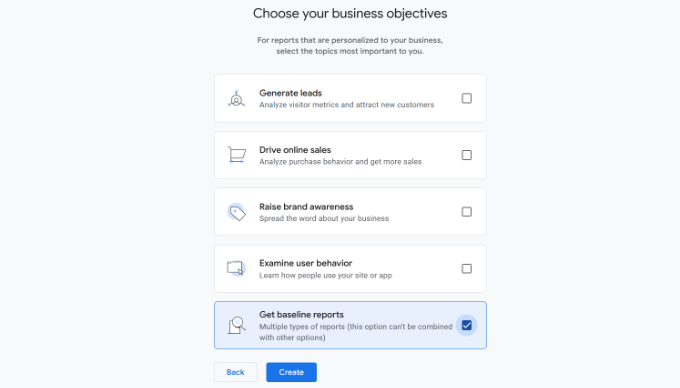
完了したら、「作成」ボタンをクリックするだけです。
ステップ4:Google アナリティクス ウェブストリーム オプションが表示されます。
WordPressサイトにGoogleアナリティクスを設定するので、プラットフォームとして「Web」を選択します。
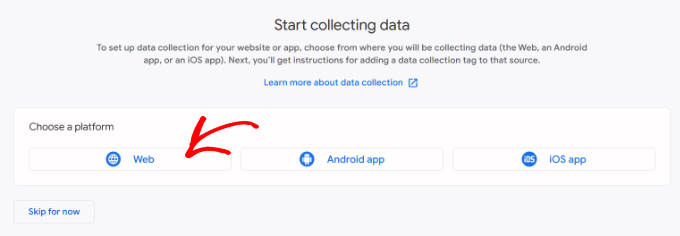
その後、サイトのURLとストリーム名を入力します。
初期設定では、Googleアナリティクスは「拡張測定」オプションを有効化しています。これにより、Googleアナリティクスでページビュー、スクロール、送信クリック、ファイルダウンロードなどをトラッキングできるようになります。
📝注意: MonsterInsightsプラグインを使用する予定がある場合は、’Enhanced measurement’オプションをオフにしてください。そうしないと、プラグインは2倍の量のデータを収集し、表示します。
次に、「ストリームを作成」ボタンをクリックします。
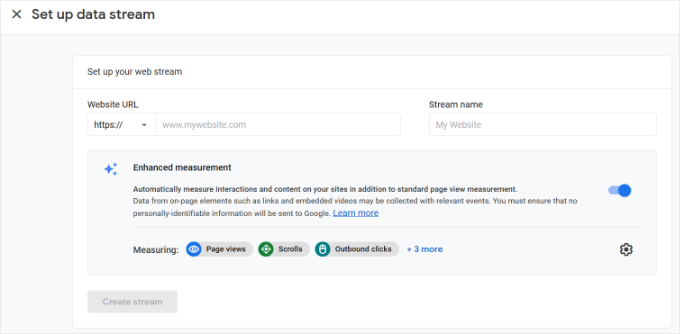
ストリーム名、URL、ID、測定IDが表示されます。
また、記録されるさまざまな強化測定値も表示される。
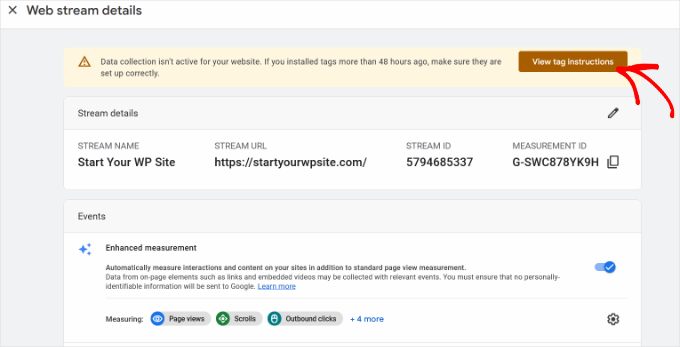
上部には、GoogleアナリティクスをWordPressサイトに追加する方法を示すアラートバーも表示されます。
タグの表示」ボタンをクリックしてください。これで、WordPressサイトにGoogle アナリティクスのトラッキングコードを追加するさまざまな方法が表示されるはずです。
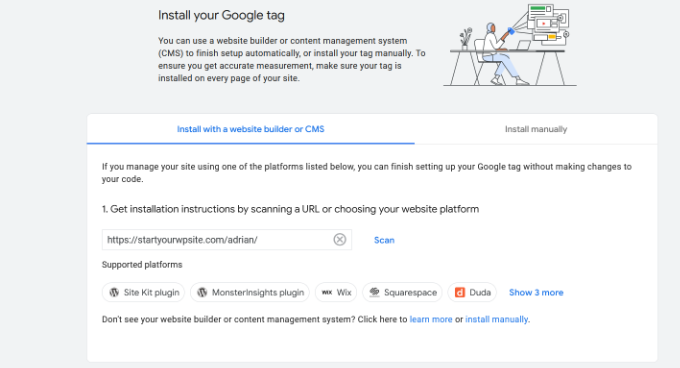
次に、「手動でインストール」タブに切り替えます。
Google アナリティクスのトラッキングコードが表示されます。
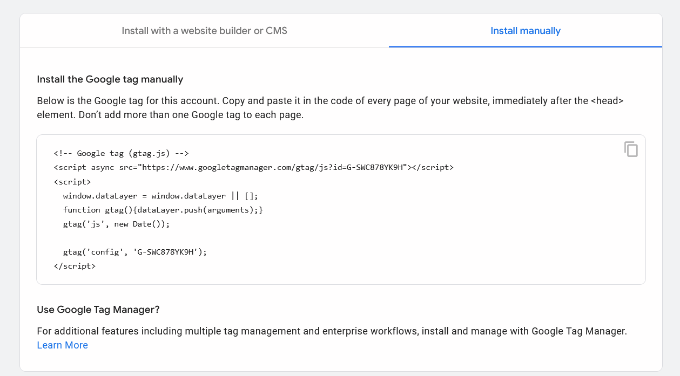
このトラッキングコードをコピーして、WordPressサイトに入力する必要があります。また、このブラウザータブを開いたままにしておき、必要なときに切り替えてコードをコピーすることもできます。
アナリティクス」のブラウザー・タブは開いたままにしておくことをお勧めします。WordPressサイトにコードをインストールしたら、再訪問する必要があるかもしれないからです。
Google アナリティクスのアカウントを設定したところで、WordPressにGoogle アナリティクスをインストールする方法を見ていきましょう。
WordPressにGoogleアナリティクスをインストールする方法
WordPressでGoogleアナリティクスを設定するには、いくつかの方法があります。ここでは3つの方法を紹介するが、最初のオプションが最も簡単で、最後のオプションが最も難しい。
自分のニーズに合ったものを選ぶことができる。
💡プロからのアドバイス:Googleアナリティクスアカウントでページビューの二重トラッキングを避けるために、サイトでこれらの方法のうち1つだけを使用する必要があります。
方法1:MonsterInsightsによるWordPress用Googleアナリティクス
MonsterInsightsは、WordPress用の最も人気のあるGoogleアナリティクスプラグインです。Bloomberg、PlayStation、Zillow、WPBeginnerなど、300万以上のサイトが利用しています。
MonsterInsightsは、WordPressにGoogleアナリティクスを追加する最も簡単で、圧倒的に優れた方法です(初心者から上級者まで、すべてのユーザーにとって)。MonsterInsightsは有料のプレミアムプラグインと無料版の両方があります。
WPBeginnerでは、フォーム送信、CTAボタンのクリック、リファラーリンクのパフォーマンスなど、さまざまなトラッキングタスクにMonsterInsightsを使用しています。なぜMonsterInsightsが素晴らしいプラグインなのかは、MonsterInsightsのレビューをご覧ください。
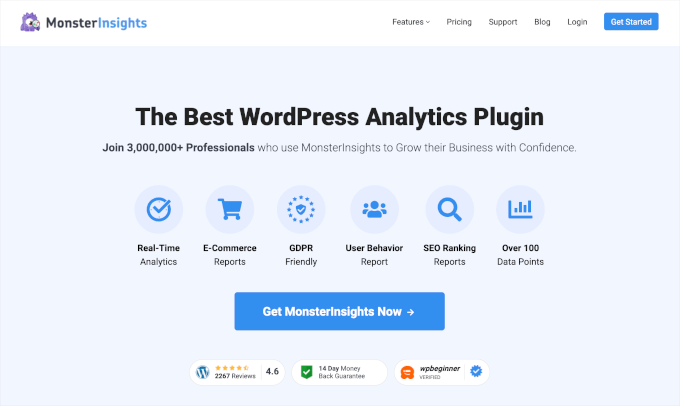
このチュートリアルでは、MonsterInsights無料版を使用します。
eコマーストラッキング、広告トラッキング、著者トラッキングなど、より高度な機能をご希望の場合は、MonsterInsights Proバージョンをご利用ください。設定方法は同じです。
始めよう。
まず最初に、MonsterInsightsプラグインをインストールして有効化します。詳しくは、WordPressプラグインのインストール方法のステップバイステップガイドをご覧ください。
プラグインを有効化すると、WordPressの管理メニューに「Insights」という新しいメニュー項目が追加され、ようこそ画面が表示されます。Launch the Wizard」ボタンをクリックしてください。

クリックするとMonsterInsightsのセットアップウィザードが開きます。
まず、ウェブサイト(ビジネスサイト、ブログ、オンラインストア)のカテゴリーを選択するよう求められます。いずれかを選択し、「保存して続行」ボタンをクリックします。
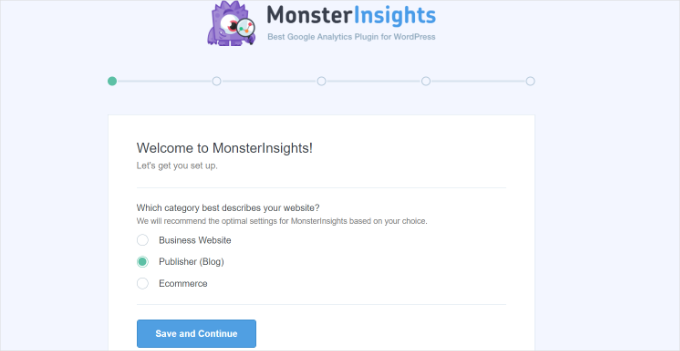
次に、MonsterInsightsとWordPressサイトを接続する必要があります。
MonsterInsightsを接続する」ボタンをクリックするだけです。
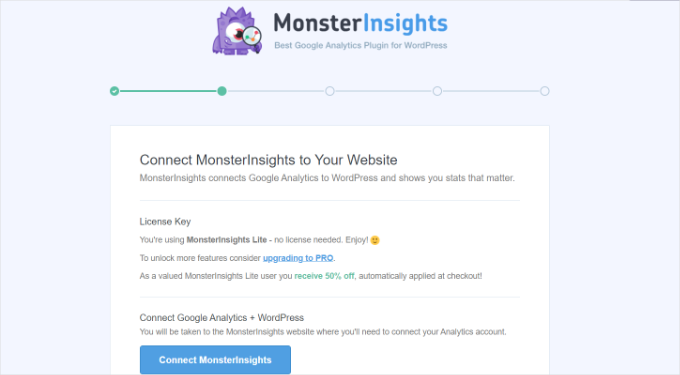
ログインするか、すでにログインしている場合はGoogleアカウントを選択します。
Googleアカウントを選択するか、メールを入力してログインしてください。
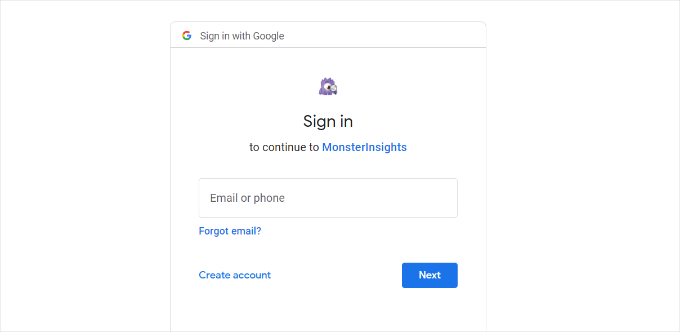
次に、MonsterInsightsがGoogleアナリティクスアカウントにアクセスすることを許可するよう求められます。
許可」ボタンをクリックして続行する。
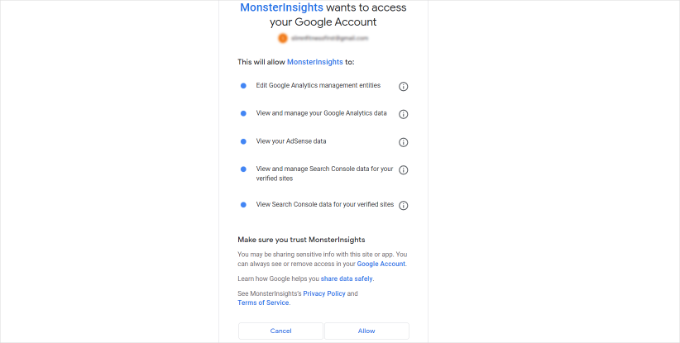
接続を完了するための次のステップは、追跡したいプロフィールを選択することです。
ここでサイトを選択し、「Complete Connection(接続を完了する)」ボタンをクリックして続行します。
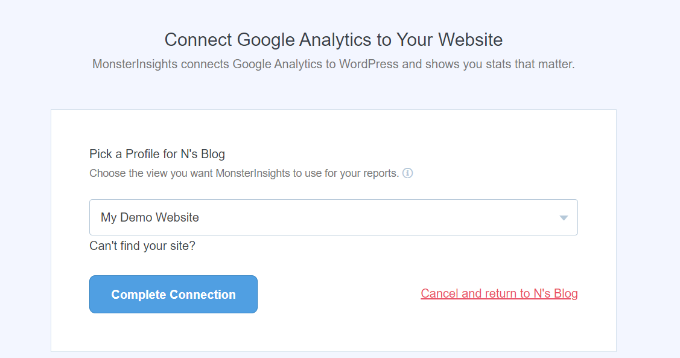
その後、「Complete Connection」ボタンをクリックしてください。これでMonsterInsightsがあなたのサイトにGoogleアナリティクスをインストールします。
次に、サイトの推奨設定を選択するよう求められます。
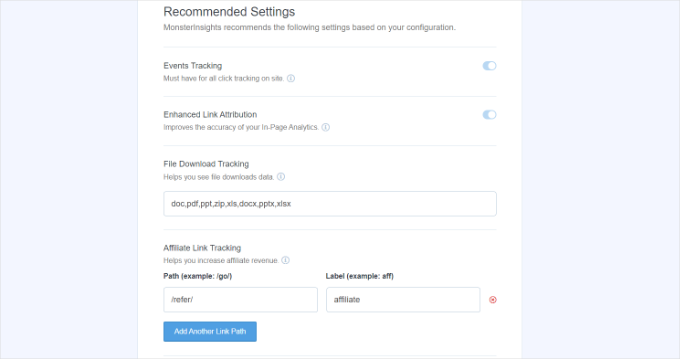
初期設定はほとんどのサイトで機能します。アフィリエイトリンクのプラグインを使用している場合は、アフィリエイトリンクのクロークに使用するパスを追加する必要があります。これにより、Googleアナリティクスでアフィリエイトリンクをトラッキングできるようになります。
MonsterInsightsはまた、誰がレポートを見ることができるかを尋ねます。WordPressのユーザー権限グループを選択することができます。
設定が完了したら、「Save and Continue(保存して続行)」ボタンをクリックして設定を保存します。
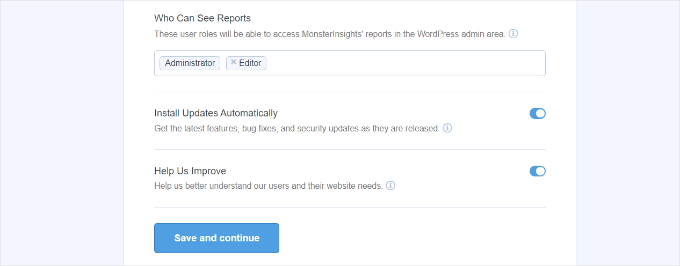
次に、MonsterInsightsが有効化したいトラッキングサイトのリストを表示します。
下にスクロールして「Continue」ボタンまたは「Skip for Now」オプションをクリックします。
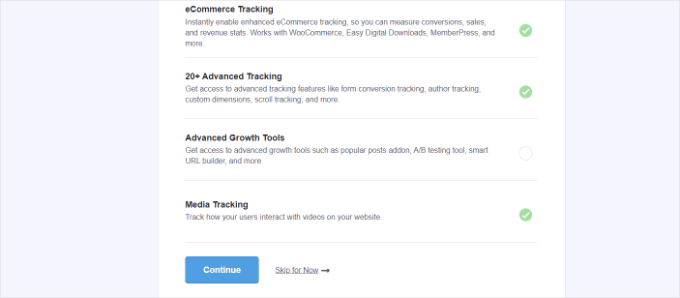
次の画面では、MonsterInsightsがGoogleアナリティクスのトラッキング設定に成功したことを表示します。
Google アナリティクスが接続され、トラッキングコードがインストールされ、データが収集されていることがわかります。
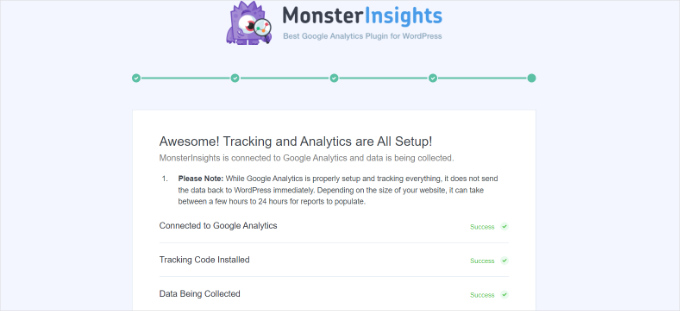
次に下にスクロールすると、ライセンスキーを入力する欄があります。
アップグレードせずにセットアップを完了する」オプションをクリックします。
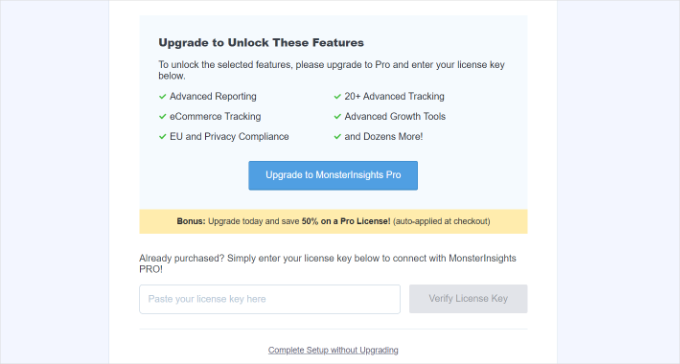
WordPress サイトに Google アナリティクスを追加できました。
Google アナリティクスで拡張測定の無効化
GA4でMonsterInsightsにデータストリームを作成させる代わりに、自分でデータストリームを作成した場合は、Enhanced Measurementをオフにする必要があります。
それは、MonsterInsightsが複数のカスタム拡張トラッキング機能を追加しているからです。拡張測定オプションを有効化したままにしておくと、データに歪みが生じ、正しくない結果が表示されます。
まず、ブラウザーでGoogleアナリティクスのタブまたはウィンドウにアクセスします。ここから、左下にある「管理者」設定オプションをクリックします。
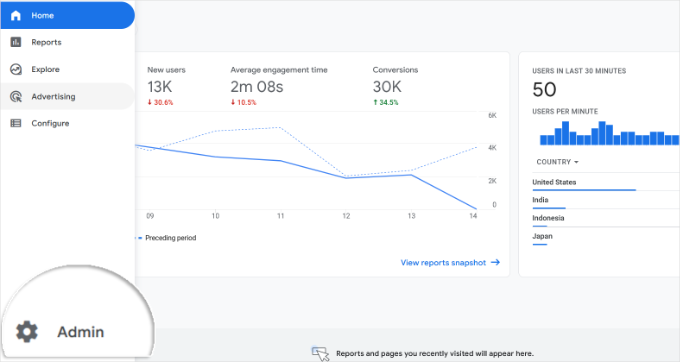
管理者」ページに入ると、さまざまな設定が表示されます。
データストリーム’オプションをクリックするだけです。
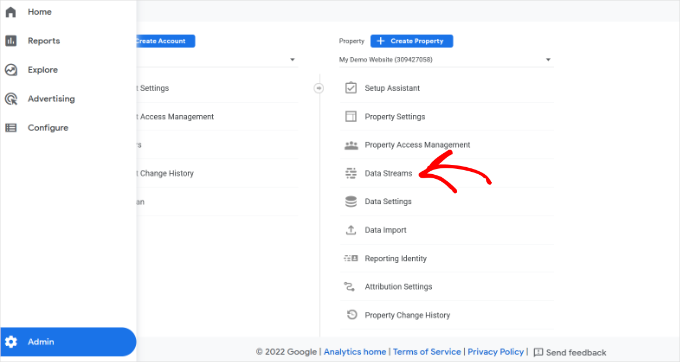
次に、データストリームが表示されます。
MonsterInsightsで接続したデータストリームを選択するだけです。
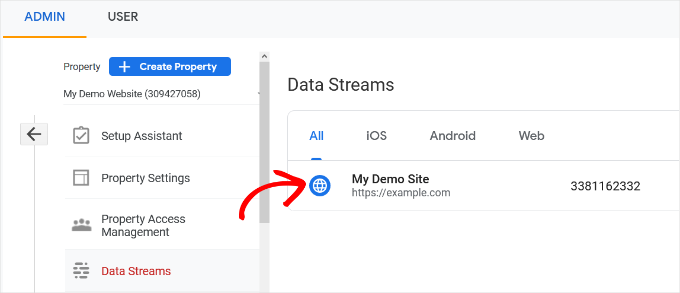
次の画面で、’Enhanced measurement’ オプションを無効化する必要があります。
トグルをクリックするだけです。
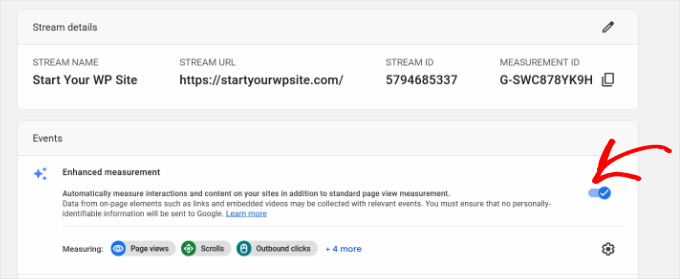
次にポップアップウィンドウが開き、強化測定をオフにすることを確認します。
オフにする」ボタンをクリックしてください。
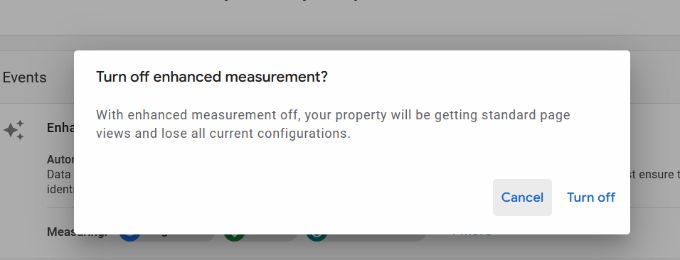
Google アナリティクスでデータ保持設定を変更する
初期設定では、Googleアナリティクスはデータ保持設定を2ヶ月に設定します。しかし、これを変更することで、2ヶ月を超えてもカスタムレポートでデータを使用できるようになります。
まず、管理 ” データ設定 “Googleアナリティクスのデータ保持にアクセスします。
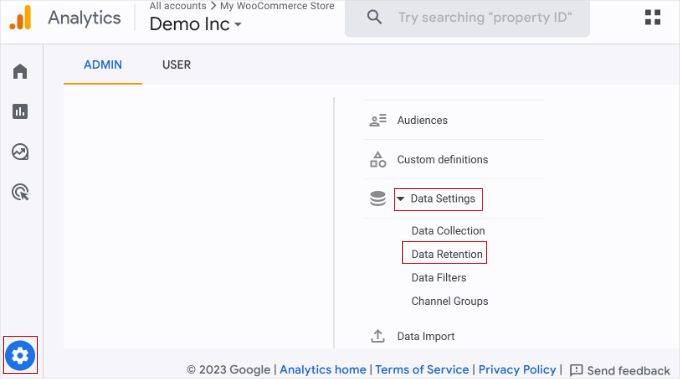
次に、「イベントデータ保持」のドロップダウンメニューをクリックします。
ここから、「14ヶ月」オプションを選択し、「保存」ボタンをクリックするだけです。
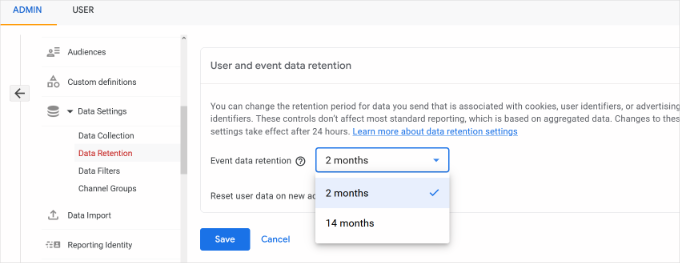
Google アナリティクスが統計情報を表示するまでに時間がかかることを忘れないでください。
💡プロのヒント:Google アナリティクスでは、データの保存期間を14ヶ月に延長することができますが、初期設定の2ヶ月を選択した場合でも、GDPRのようなプライバシー規則は適用されます。
そのため、トラッキングを行う前にユーザーの同意を得る必要があります。また、プライバシーポリシーにデータの保存期間を記載しておくと良いでしょう。
どのように始めたらよいかわからないですか?GDPR/CCPAのためにWordPressでCookieポップアップを追加する方法については、こちらのガイドをご覧ください。
WordPressダッシュボード内でGoogleアナリティクスレポートを表示する
MonsterInsightsの最も優れた点は、WordPressダッシュボード内でGoogleアナリティクスレポートを表示できることです。
インサイト ” レポートページで、アナリティクスデータの概要を簡単にチェックできます。
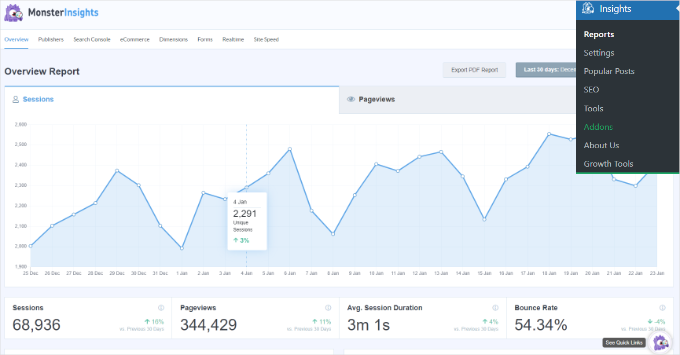
また、MonsterInsightsのレポートに直接注釈を追加して、サイトに加えた主な変更を記録することもできます。
例えば、新しいブログ投稿を公開した時、新しいランディングページを追加した時などにメモを追加することができます。これにより、これらのイベントがトラフィックにどのような影響を与えたかをトラッキングしやすくなります。
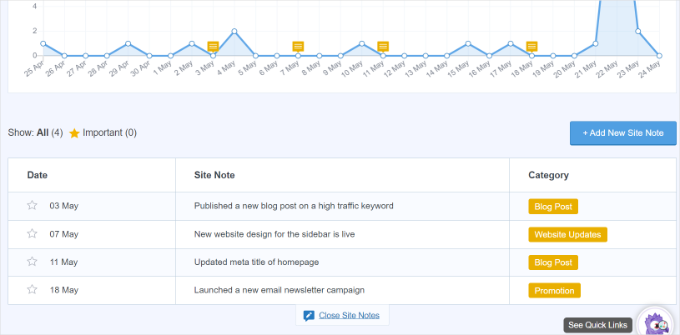
詳しくは、WordPressでGA4サイトアノテーションを取得する方法をご覧ください。
MonsterInsightsの新機能「会話AI」によって、興味のあるサイトの統計について質問することもできます。
例えば、eコマースのサイトを持っている場合、特定の期間に製品からどれだけの収益を上げたかを尋ねることができます。
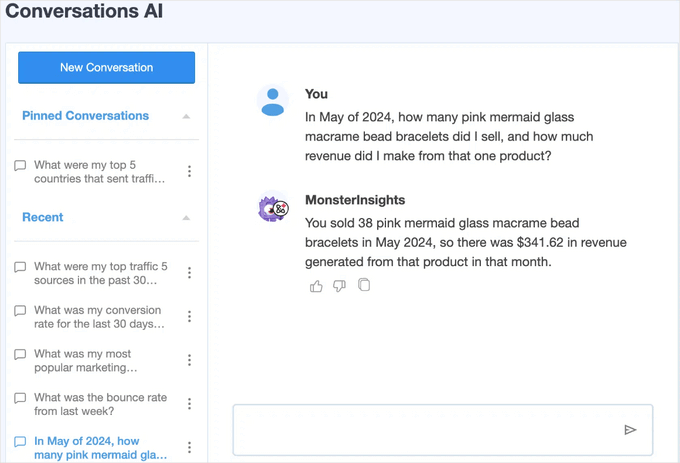
特にアナリティクスを始めたばかりの場合は、必要なデータを探すためにレポートを検索するよりもはるかに簡単です。
さらに、MonsterInsightsにはPopular Postsアドオンが付属しており、トラフィックとページビューを増加させるために、パフォーマンスの高いコンテンツを表示することができます。
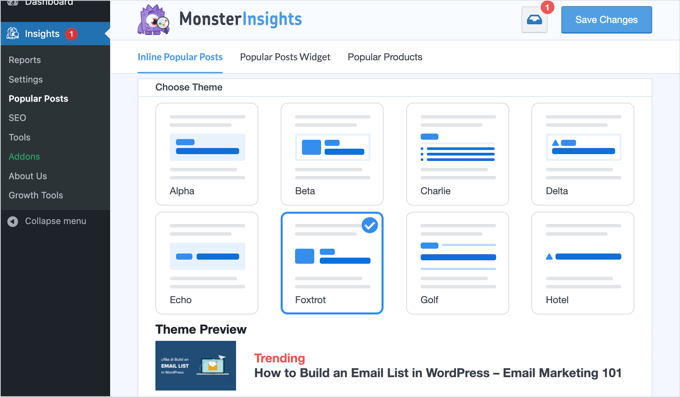
人気投稿のインラインリンクを自動的に追加して、エンゲージメントを高めることができます。
オンラインショップを運営している場合は、各ブログ投稿の末尾に売れ筋商品を自動的に追加して、売上を伸ばすこともできる:

WordPressブログを運営しているなら、Page Insightsアドオンが超便利だ。
インストーラをインストールすると、「すべての投稿」画面、フロントエンド(ログイン中)、コンテンツエディター画面にブログの統計情報が自動的に追加されます。
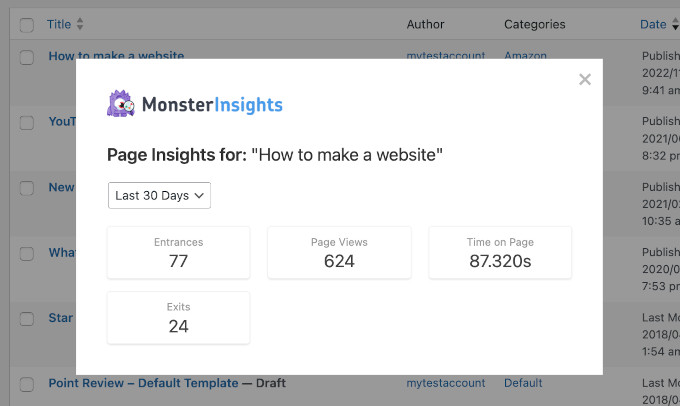
🌟インサイダー注:MonsterInsightsは以前、Google アナリティクス for WordPress by Yoastとして知られていました。WPBeginnerの創設者であるSyed Balkhiは、2016年にこのプラグインを買収し、MonsterInsightsにリブランドしました。現在は、当社のプレミアムWordPressプラグインファミリーの一部となっています。
方法2:WPCodeを使ってWordPressにGoogle アナリティクスをインストールする
この方法では、手動でWordPressにGoogleアナリティクスをインストールする方法をご紹介します。WPCodeを使ってGA4トラッキングコードをサイトのヘッダーに追加します。
⚠️ はじめに、この方法は高度なトラッキング設定ができないため、MonsterInsightsほど優れていないことにご注意ください。また、WordPressダッシュボードでGoogleアナリティクスのデータを表示することもできません。
WPCodeプラグインを使用すると、テーマファイルを編集することなく、WordPressサイトにカスタムコードスニペットを安全に追加することができます。
私たちのビジネスパートナーの一部は、トラッキングスクリプト、カスタマイザー機能、およびその他の高度な設定を管理するためにWPCodeを使用しており、それは非常にうまく機能しています。プラグインについてさらに詳しく知りたい方は、WPCodeのレビューをご覧ください!

まず、先ほどのステップ4でGoogleアナリティクスのアカウント作成時にコピーしたトラッキングコード(グローバルサイトタグ)をコピーします。
インターフェースはこんな感じだ:

次に、WPCodeプラグインをインストールし、有効化する必要があります。詳しくは、WordPressプラグインのインストール方法のステップバイステップガイドをご覧ください。
📝注意: 無料のWPCodeプラグインを使って、Googleアナリティクスのトラッキングコードをインストールすることができます。
しかし、WPCode Proにアップグレードすることで、より強力な機能が利用できるようになります。例えば、完全なリビジョン履歴で変更を追跡したり、コードスケジューリングで特定の時間にスニペットを自動的に有効化または無効化することができます。
有効化したら、Code Snippets ” Header & Footerページにアクセスする必要があります。ここで、先ほどコピーしたGoogleアナリティクスのトラッキングコードを「ヘッダー」セクションにペーストしてください。
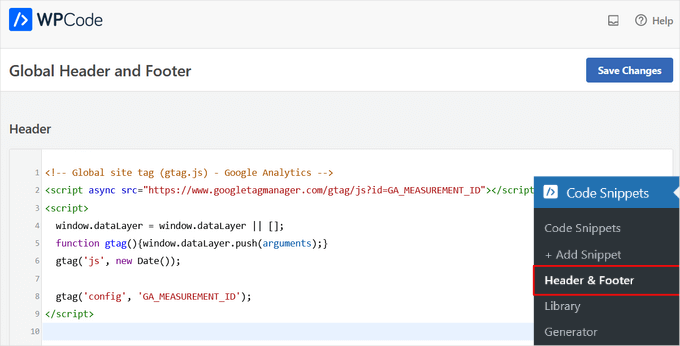
変更を保存」ボタンをクリックして、設定を保存することを忘れないでください。
以上で、Google アナリティクスのサイトへのインストールはすべて完了です。
方法3:WordPressテーマにGoogleアナリティクスをインストールする
この方法は、コードに詳しい上級ユーザー向けだ。テーマを変更したり更新したりするとコードが消えてしまうので、やや信頼性に欠ける。
この方法を使うことはほとんどお勧めしない。
WordPressファイルにコードを追加するのが初めての場合は、WordPressでコードスニペットをコピー&ペーストする方法をご覧ください。
まず、ステップ4でコピーしたGoogleアナリティクスのトラッキングコードをコピーします。ウェブストリームインストールセクションの「手動インストール」タブで表示できます。

WordPressテーマ・ファイルにこのコードを追加する一般的な方法は2つあります。どちらか一方を選べばよい(両方は不可)。
1.header.phpファイルにコードを追加する
WordPressテーマのheader.phpファイルを編集し、<body>タグの直後に先ほどコピー&ペーストしたGoogleアナリティクスのトラッキングコードを貼り付けるだけです。
変更を保存し、サーバーにファイルをアップロードすることを忘れないでください。
2.関数ファイルによる追加
GoogleアナリティクスのトラッキングコードをWordPressの関数ファイルに追加することもできます。そうすれば、WordPressサイトのすべてのページにトラッキングコードが自動的に追加されます。
テーマのfunctions.phpファイルにこのコードを追加する必要があります。
1 2 3 4 5 6 7 | <?phpadd_action('wp_head', 'wpb_add_googleanalytics');function wpb_add_googleanalytics() { ?> // Paste your Google Analytics tracking code from Step 4 here <?php } ?> |
上記のスニペット内の「Paste your Google アナリティクス tracking code from Step 4 here(ステップ4で使用したGoogleアナリティクスのトラッキングコードをここに貼り付ける)」の部分を、Googleアナリティクスのコードに置き換えることをお忘れなく。
Google アナリティクスでレポートを表示する
Google アナリティクスは、あなたの統計から収集されたデータの宝庫を表示することができます。Google アナリティクスのダッシュボードにアクセスすると、このデータを表示できます。
左のカラムにビルトインのGoogleアナリティクスレポートが表示されます。各セクションは異なるタブに区切られており、タブをクリックすると展開され、より多くのオプションが表示されます。
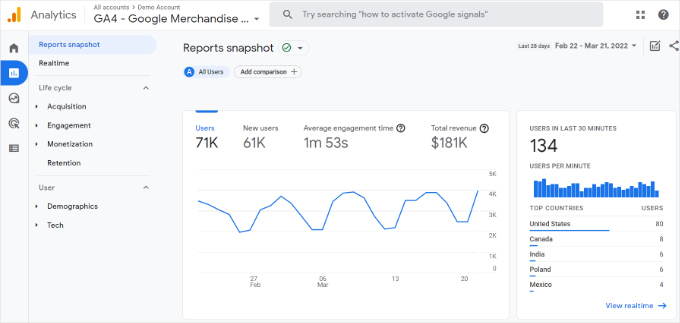
Google アナリティクス 4のレポートは、これまでのユニバーサル アナリティクスのレポートとは少し異なります。左の列には、専用のレポートオプションがあります。レポートは、ライフサイクルとユーザーを含む2つのカテゴリーにまとめられています。
GA4のレポートで最も顕著な違いの1つは、直帰率の指標がないことです。それ以外には、新しいレポートインターフェース、エンゲージメント時間のような新しい指標、GA4にゴールがないことなどがあります。
Google アナリティクス4の各種レポートの内訳は以下の通りです:
- リアルタイムレポートはユニバーサルアナリティクスに似ており、サイト上の有効化したユーザーをリアルタイムで表示します。
- 獲得レポートは、オーガニック、リファラー、メール、アフィリエイトなど、ユーザーがどの媒体を使ってあなたのサイトを見つけたかを示します。
- エンゲージメントレポートは、サイト上で発生したコンバージョンやイベントを表示します。
- マネタイズレポートは、アプリ内課金やパブリッシャー広告などの新しいレポートとともに、eコマースデータをすべて一箇所に表示します。
- リテンションレポートは、基本的に新規訪問者と再訪問者を表示し、ユーザーリテンションに関する洞察を得るのに役立ちます。
- デモグラフィックスレポートでは、上位の国や都市などからのサイトトラフィックを確認することができます。また、性別の内訳や関心度のレポートも表示されます。
- テックレポートでは、人々がどの端末、ブラウザー、オペレーティングシステム、アプリのバージョン、画面サイズを最も使用してサイトを表示しているかを表示します。
Google アナリティクスを最大限に活用しよう
Google アナリティクスは、驚くほどパワフルなツールで、素晴らしい機能がたくさんあります。その中には、ごく当たり前で簡単に使えるものもあれば、追加設定が必要なものもある。
Google アナリティクスのレポートを最大限に活用するためのリソースをご紹介します。
- Google アナリティクスで WordPress のユーザーエンゲージメントをトラッキングする
- WordPressで検索アナリティクスを見る方法
- WordPressでアウトバウンドリンクをトラッキングする
- Google アナリティクスから個人を特定できる情報を排除する方法
- Google アナリティクスでWordPressのフォームトラッキングを設定する方法
- Google アナリティクスで WooCommerce のカスタマイザーをトラッキングする
- Google アナリティクスでカスタムメールアラートを簡単に取得する方法
Google アナリティクスは、Google Search Console(旧Googleウェブマスターツール)との連携が最適です。検索結果であなたのサイトがどのように表示されているかを確認することができます。Google Search Consoleの使い方については、Google Search Console完全ガイドをご覧ください。
WordPressのSEOランキングを向上させ、より多くのトラフィックを獲得したいのであれば、オールインワンのSEOツールキットであるWordPress用AIOSEOプラグインの使用をお勧めします。
AIOSEOには無料版もあるので、そちらを使うこともできる。
このプラグインは、適切なスキーママークアップ、サイトマップ、SEOランキングを向上させるために必要なあらゆるものを使ってWordPressサイトを完全に最適化するのに役立ちます。
動画チュートリアル
その前に、WordPressにGoogle アナリティクスをインストールする方法の動画チュートリアルをお見逃しなく!▶️。
この投稿が、WordPressにGoogleアナリティクスをインストールする方法を学ぶのにお役に立てば幸いです。Google アナリティクスと Jetpack Stats の比較や、初心者のためのWordPress GA4 ガイドもご覧ください。
If you liked this article, then please subscribe to our YouTube Channel for WordPress video tutorials. You can also find us on Twitter and Facebook.





Benjamin
Hi,
Great video. What if you wanted to paste the Google Analytic code on a specific page. I wanted to paste mine on the “CART” and “CHECKOUT” pages of my website.
Thanks in advance.
Benjamin
Sharon
Hi, thanks so much for this! I have a question though.
So I didn’t set up my wordpress site, the intern before me did. And instead of inserting the google analytics tracking code in a plugin, he inserted it in the theme header and footer.
I foresee myself changing the theme, and just to save myself and the next intern a lot of trouble, I want to insert the google analytics tracking code through a plugin.
There are two problems I am facing though.
1. The universal tracking code that google analytics give me is this:
But I spotted the tracking code in the theme footer to be an extended version that looks like this:
So my question is, what is the difference between the two tracking codes? Does the extended version serve an additional function? If yes, what is this function?
2. When I tried to insert the google analytics code through the plugin “Insert Header and Footer”, and then when I checked my wordpress site, my google tag assistant says that there are multiple tags detected. My question is – are multiple tags a problem? Will it affect the tracking in any way?
Would really appreciate any help! Thank you!
WPBeginner Support
You should only use either one of these codes. Just to be on the safe side, use the code provided by Google Analytics ua tracking.
Admin
Patricia
Thank you for this!
Nate Balcom
I wouldn’t say I’m a WordPress beginner, but I always forget where to embed the GA Code. That and it’s changed over the years. Thanks for the post. Love the site too. Great design.
Sally
Very helpful, thanks!
Beth
Thank you! This was so helpful!
Kate
This was very helpful. Thank you!
Gabrielle Tyler
Thank you for the easy, quick and useful info!
Sundar
Useful info. Presented well.
Amanda
When I searched for your plugin, it said it was untested with the current version of WP. Not sure if you knew that because you are so big.
Thanks for all this information.
WPBeginner Support
Please take a look at our explanation here, should you install plugins not tested with your WordPress version
Admin
Barry Richardson
Your Search box does not seem to be working – I tried in Firefox and Chrome!
Michele
Great and informative. However, I am not using WordPress.com Business but the premium version. I am still not able to add in the code as under setting, I dont see the install headers and footers option. How do I go about it?
Meg
Hi,
the plugin instructions say “Paste the Google Analytics code in the plugin’s setting page.” Does this mean the plugin editor? I can’t work in where to drop the code in..
Thanks in advance,
Meg
WPBeginner Support
If you are using Insert Headers and Footers plugin, then simply go to Settings » Insert Headers and Footers in your WordPress admin area. There you will see two boxes. Paste your Google Analytics code in the first box and save your changes.
Admin
priscilla
Hi, complete beginner here with wp plugins. i dont have a clue how to install the insert header and footer plugin? i pressed download and then it goes into my computers download folder but what do i do next? i have my google analytics code ready to paste as soon as i can figure out this plugin. thanks!
WPBeginner Support
Please take a look at our Step by Step Guide to Install a WordPress Plugin for Beginners.
Rob Stephens
I’ve installed your Insert ‘Header and Footer’ plugin – I was just wondering if the analytics gets put on every page on my website or just the homepage?
WPBeginner Support
Every page.
Admin
Kaugip
Helpful as always!
I do prefer plugins, but in this case I’m using google analytics on ocimpress – it’s built using WordPress but is not compatible with it’s plugins.
Nirmal
Thanks for your excellent article. I managed to add Google Analytics to my site following your article.
Frank
thanks for the clear and easy to follow steps provided on activating the code into my wordpress site it was just like A B C…….
Keep it up i will continue subscribing to more of your products.
Lebo
wpbeginner has helped me configure my site to be one of the most high ranked website on google organic search results for my keywords
Dora
Thank you for this article! I wasn’t sure how to implement the code to my website, after reading your article it took me 5 minuets to download and set the plugin and now my new website is all set with Analytics!
Safwan
I pasted the code as suggested using the plugin mentioned in the article….
I still cannot see any stats in the reporting tab.
Please help
Nicole
Thank you for the instructions – hopefully I did everything properly!
Paul
Worked well and very easy to do with “Insert Headers and Footers” Plugin. I added ours to the footer and it worked straightaway when I checked in the real time feature of GA. Thanks for your post.
Steven Taitinger
I think free wordpress.com sites can use Google Analytics if they have purchased their own domain name. Google has a Domain name provider method of verifying you own your site.
Candice
Thank you so much… you guys make everything so easy!! you rock!! xx
nasri
Video was very helpful, thank you
Thessauron
Thanks! If only everyone can explain in the concise, clear way you do.
McKenzie
Wow, you’re a lifesaver!!!!
Shruti
Hi,
I have pasted the google analytics code by insert header and footer plugin in header and footer. But how can I change it to before as my webpage is not crawling by search engines so for time being I have removed the code.
Can you tell me some other way which can be work out to paste it before .
My current theme doesn’t support in editor section. And I don’t know developer techniques.
Wander Bite
Hello,
I have installed the Google Analytics by Yoast and it is not working! The first step in the plugin is to ‘authenticate with your google account’. When I click on that to copy and paste the code, it doesn’t seem to take it for me to continue! I have tried it many times and still nothing. Please help!
Liz Packwood
Hi, I’ve entered a Google Analytics authentication code into my Yoast SEO plugin. But can you please tell me how do I access my GA dashboard for my website. And once my site is authenticated, do I still need to insert the tracking code onto all my pages. If I am using the free Yoast SEO plugin, I thought it might handle all this for me but I see no evidence of this…Do i still need to activate the ‘ insert headers and footers’ plugin? Any advice? Thanks so much for your great helpful site
WPBeginner Support
You will still need to enter your Google Analytics code.
Admin
sazia kazia
Hi,
First time I visited on this website. Its looking so helpful and found knowledgeable content. Great post and useful to all bloggers. On my hostgator hosting traffic shows different and in analytic its very less comparing to hostgator. i logged in in analytic with different google id it is showing different result for each id. I think need to set up analytic..Please have a look on my website and feed back how to improve it. I am using genesis work frame + pro theme..Thanks for sharing
WPBeginner Support
It is possible and completely normal for different analytics solutions to show different statistics. There are a variety of reasons for that, you can find more information on the topic on analytics support forum.
Admin
Jake
great tutorial! two thumbs up
Editorial Staff
Thanks
Admin
vahid mohammadi
thanks great article
but can i use my Gmail to manage unlimited sites
or its 1 gmail per site
Erik
Hey Vahid, Google allows 50 sites per account. Enjoy!
Have an awesome day.
James
Thank you for nice tutorial.
mohammad koleiny
i want to say thanks for your useful article!
i use the method one and it’s work for me fine
thanks again
Jennifer Modisette
Thank you for this article. I have installed my google analytics code in the plug-in you suggested. I did this about 12 hours ago. So far I can not see any activity on google analytics. Is this normal or have I not installed it correctly?
WPBeginner Support
It is normal. You can visit the Real Time section under reporting and then visit your website from some other device. You will be able to see it detected in the real time results.
Admin
Cephas
Will try it out. Hope it works
Jenny
Thanks for the article, I’ve installed Google Analytics on my personal blog and now I can finally check my statistics. However it displays so many data that I’m not sure if I understand everything correctly – is there any way to simplify statistics reports? Maybe some stats displayed as infographic or so?
Deelip
Hey
Amazing article, learnt a lot from your blog. Thank you.
I have a website and a wordpress blog, is it possible to link both so that i can see the same in one analytics account?
Regards
Deelip
WPBeginner Support
If they are on the same domain then you can use the same analytics code on both sites.
Admin
Malin Johansson
Hi!
I´ve tried to seek information about plugins and Google analytics.
If I understand correctly you must have wordpress.org ? Or is it enough to upgrade wordpress.com to premium to be able to use plugins?
Thanks
/Malin
WPBeginner Support
No you will still need a self hosted WordPress.org site to take full advantage of plugins. Please see our guide on the difference between self hosted WordPress.org vs free WordPress.com blog.
Admin
Sacha H
This was a really helpful article. But, I think there is a flaw with your plugin. It includes no way to exclude admin traffic. So Google Analytics will still show internal traffic! Yoast’s Google Analytics plugins include a way to exclude internal traffic.
Iris Dorreboom
Hi!
Thanks for the plug-in, really a great help for someone who doesn’t know her way around the code stuff. One question: is just pasting the code once in the header section enough to get all your pages and posts followed?
By the way, I also follow your blog, and that’s very helpful, too! Thanks!
Iris
WPBeginner Support
Yes pasting the code once in header is enough.
Admin
Iris Dorreboom
Thanks! However, I may have done it twice by mistake – where do I check whether it appears only once in the code?
mark p
Hello, thanks for the write-up. Helpful indeed! I have the analytics code in and working, been so for about a month or two now. I just noticed however that my analytics code is showing up at bottom of my pages .. i have inserted in my header.php.
I followed syntax rules I cant understand why it is showing itself .. any recommendation?
Mark Assing
Does it matter if the script is in both the header and the footer? And now that I’ve added Google Analytics to my website, where do I go to get the data? Do you have a tutorial about Analytics itself. Thanks for your help.
WPBeginner Support
Yes, it does matter. You can only have Google Analytics tracking code once on every page. See our beginner’s guide on how to use Google Analytics for your WordPress site
Admin
Katie
Video was very helpful, thank you!
Amin
Hi there,
unfortunately I can’t install the above mentioned Plugin “install headers and footers” to my site. Error: The package could not be installed. PCLZIP_ERR_BAD_FORMAT (-10) : Unable to find End of Central Dir Record signature
Note: wpbeginners transfered my old wordpress.com site to the new wordpress.org!
Regards,
Amin
WPBeginner Support
This error may occur when you do not have enough disk space on your web server. Please contact your web host’s support for assistance.
Admin
Jarret Ruminski
Great article. Just one comment: you guys really fly through the videos. For those of us with no web/tech background, you should slow down the pace a bit so we can follow without constantly having to go back. Other than that, great job.
WPBeginner Support
Thanks for the feedback, we are aware of it already trying to improve on that in newer videos. Please take a look at some our new videos in our YouTube Channel.
Admin
Hengh Cheyyo
Great Article..everything is clear. I have read all and I was able to install header and footer then I copy tracking code from google Analytics and then paste in myself… Save and then done
Simon Engström
Hi,
I noticed in your video that you pasted the tracking code into the “Scripts in footer” area. This confuses me since Google’s instruction is to paste the tracking code “immediately before the closing tag” i.e, in the Header.
Shouldn’t the tracking code be pasted into the “Scripts In Header” area then? Or perhaps it doesn’t make a difference?
Regards
Simon
Simon Engström
Hm.. My quote from Google included a piece of html code, but it was apparently removed. I tried to write “immediately before the closing tag”.
Simon Engström
Gah! Again.. Anyway, “the closing head tag”.
WPBeginner Support
You can paste it in either. However, pasting it in the header is often recommended.
Admin
Kat
Thanks for your help!